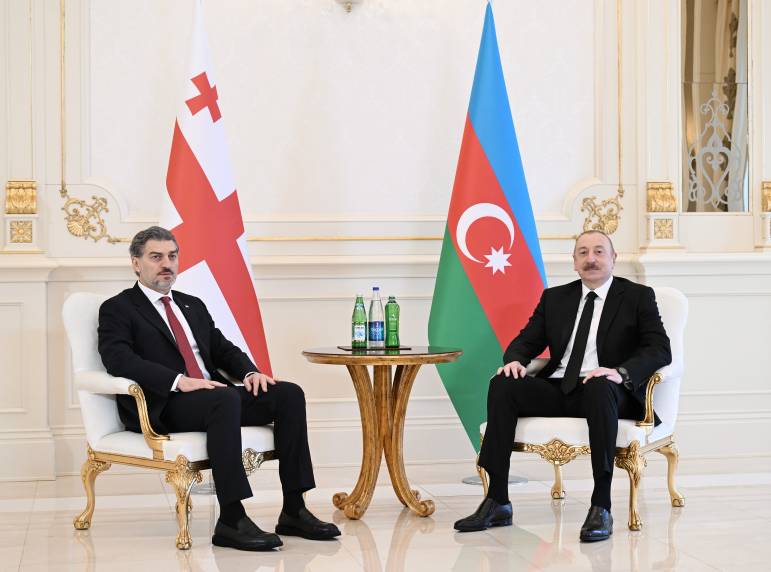20:15
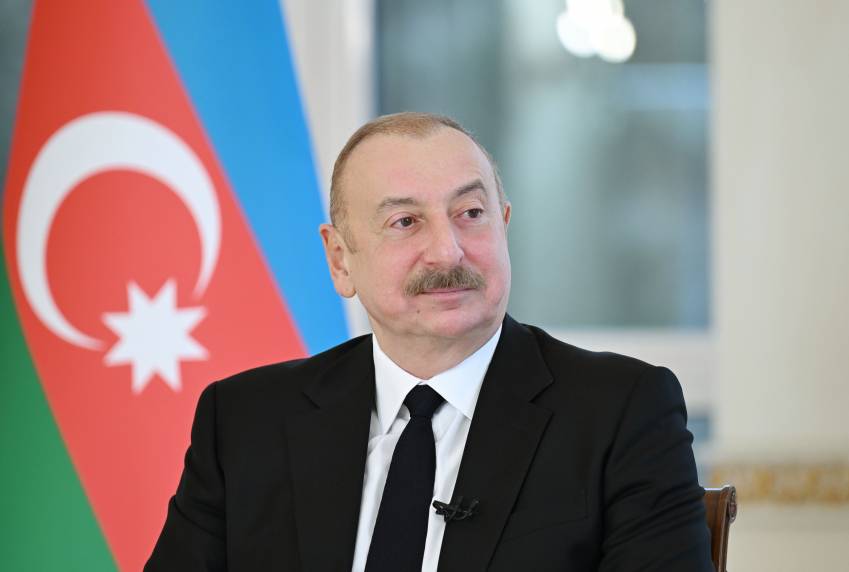
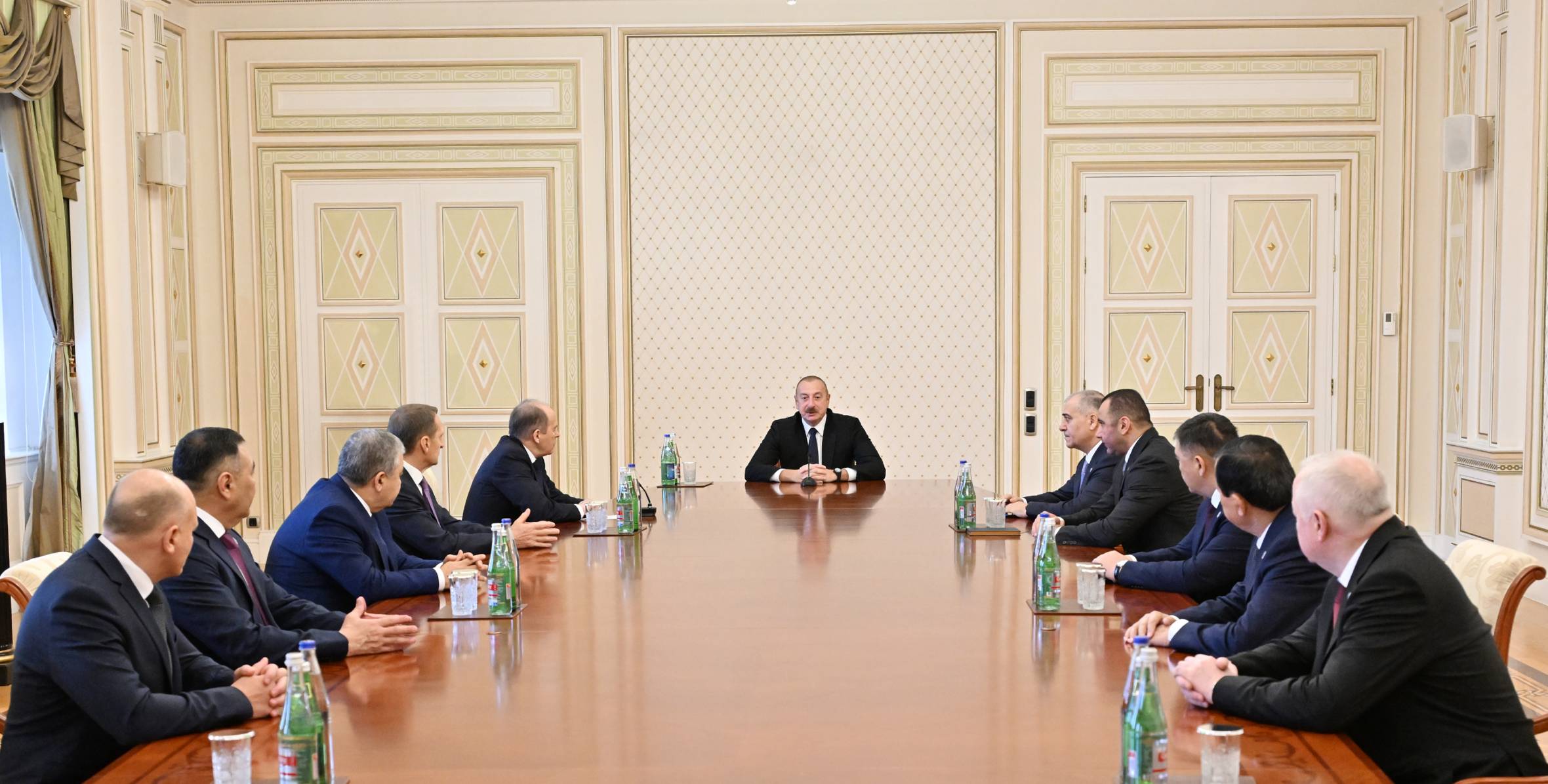
President of the Republic of Azerbaijan Ilham Aliyev has received the participants of the 53rd meeting of the Council of Heads of Security Agencies and Special Services of the CIS member countries – Director of the Russian Federation Federal Security Service, Chairman of the Council of Heads of Security Agencies and Special Services of the CIS member countries Alexander Bortnikov, Director of the Russian Federation Foreign Intelligence Service Sergei Naryshkin, Chairman of the State Security Committee of Belarus Ivan Tertel, Chairman of the National Security Committee of Kazakhstan Yermek Sagimbayev, Deputy Prime Minister of Kyrgyzstan, Chairman of the State Committee for National Security Kamchybek Tashiev, Chairman of the State Security Service of Uzbekistan Abdusalom Azizov, Chairman of the State Committee for National of Tajikistan Security Saimumin Yatimov, Head of the CIS Anti-Terrorist Center Yevgeny Sysoyev.
Welcoming the participants of the meeting, President Ilham Aliyev said:
- I am pleased to welcome our distinguished guests, heads of secret services of friendly states.
I am sure that the event in Baku will serve the cause of strengthening our interaction and make another contribution to deeper cooperation. It is noteworthy that your meeting is held on the eve of another CIS Summit, where the heads of state will have an opportunity to communicate and discuss very important issues of our interaction. Azerbaijan has always attached great importance to participation in the CIS. There are very close contacts in all directions, including, of course, the sphere of security. In the challenging international situation, your work, as well as the interaction with your colleagues, is of particular significance, as threats are growing, new centers of instability are emerging, and the stability and security of our countries largely depend on the operational work of your agencies.
I believe that at today's meeting, you will also discuss ways of strengthening cooperation. Of course, it is necessary always to exchange operational information. You know better than anyone that information is of great importance, including how quickly it is received and how quickly it is responded to. Of course, the close interaction between our countries creates excellent opportunities for our cooperation to be sincere, targeted, result-oriented and aimed at eliminating or preventing possible threats.
There are, of course, external threats in the regions where our countries are located, and operational work in this direction allows us the opportunity to minimize the risks. It is gratifying to see that public and political stability in our countries is strengthening, and our states are successfully confronting many challenges.
As far as Azerbaijan is concerned, we no longer have any internal threats. As a result of the activities conducted three weeks ago, the sovereignty of Azerbaijan has been fully restored, and, of course, this opens up opportunities for strengthening security and achieving peace in our region. We are committed to this and believe that there is no alternative to it. Proceeding from the fact that the events of recent weeks are interpreted differently in the media, first of all, in the Western media, I would say in a lop-sided and biased way and do not reflect the history of the issue or the present-day realities, I would like to briefly inform you about what has been happening over the past three years. But in order to make my information more complete, I would like to make a small historical excursion.
I will begin by saying that an entity called Nagorno-Karabakh never existed in history. There was Karabakh Khanate, which became a part of the Russian Empire in 1805. The Kurekchay Peace Treaty was signed on behalf of the Azerbaijani by Ibrahim Khalil - the Karabakh Khan, whose title was called the Khan of Karabakh and Shusha. On the Russian side, it was signed by Czarist General Tsitsianov. The text of the Treaty of Kurekchay is available on the Internet, and everyone can familiarize themselves with it. There is no mention of the Armenian population or any special rights of the Armenian population in it. In other words, it clearly says again, and historians know it well, that Karabakh is an ancient land inhabited by Azerbaijanis who have lived on this territory for centuries, for millennia. After the Kurekchay Peace Treaty, there were two more treaties between Azerbaijani khanates and Russia – the 1813 Gulistan Peace Treaty and the 1828 Turkmenchay Peace Treaty, according to which other Azerbaijani khanates, including Iravan, became part of Russia. Also, these documents naturally referred to Azerbaijani lands. After the Sovietization of the South Caucasus, the Nagorno-Karabakh Autonomous Oblast was created. Why was it created? After those 19th-century documents, mass resettlement of the Armenian population to the territory of Azerbaijan from Persia and Eastern Anatolia began. By the time of Sovietization, the national composition of the Karabakh region of Azerbaijan was not the same as it was before the beginning of the 19th century. Based on this, maybe there were some other reasons, too, Soviet power; the Soviet Union created the Nagorno-Karabakh Autonomous Region, not even a republic, but a region within the Azerbaijan SSR. It was exactly one hundred years ago. By the time centrifugal tendencies started to emerge in the Soviet Union, Armenian separatism and aggressive extremism had risen. By the late 1980s, informal extremist organizations were created. Unfortunately, this was not properly assessed by the Soviet leadership, and in many cases, it was even encouraged by it.
We all remember who was at the head of the Soviet Union in the late 1980s, and, naturally, it was impossible to expect anything else. All this led to the fact that the traditional relations of peace, friendship and harmony between the Azerbaijani and Armenian peoples were disrupted, a harmful ideology of national exclusivity and superiority was thrown in, and attempts were made to justify claims to the Karabakh land of Azerbaijan. These tendencies were transformed into overt aggression after the collapse of the Soviet Union and the occupation of Azerbaijani lands. As a result, about 20 percent of the territory of Azerbaijan – both the Karabakh region and the former Nagorno-Karabakh region, as well as seven districts that had nothing to do with that autonomous entity, were also occupied. Ethnic cleansing was carried out, more than a million Azerbaijanis were expelled from their native lands, and the situation remained as such until the fall of 2020.
Azerbaijan tried to resolve the issue peacefully in every possible way. We were engaged in long and fruitless negotiations under the auspices of the OSCE. By the way, the fact that this conflict was not resolved shows that the OSCE is in need of major transformation. We also see in this conflict the inability of the United Nations to use its authority and leverage because although four resolutions of the UN Security Council were adopted, demanding the immediate withdrawal of Armenian forces from Azerbaijani territory, they were not implemented. We waited for a long time. We had hopes. I was involved in the negotiations at different stages from 2004, but unfortunately, all hopes vanished in 2019. The prime minister of Armenia said that “Karabakh is Armenia, full stop,” thereby putting an end to all negotiations and rendering them completely meaningless. Not to mention the fact that it was an open territorial claim to the sovereign state of Azerbaijan because no country in the world, including Armenia itself, had recognized the so-called “Nagorno-Karabakh Republic.”
So, this provocative, reckless, and I would even say suicidal, as it turned out, step of the Armenian leadership, as well as other provocative actions, including those of the military nature, led to the Second Karabakh War in September 2020, which lasted 44 days and ended with the complete defeat of the Armenian army and restoration of the territorial integrity of Azerbaijan. Through the mediation of the Russian Federation and personally, President Vladimir Vladimirovich Putin, a Trilateral Statement was signed on the night of 9-10 November 2020, according to which the territories of the districts adjacent to the former Nagorno-Karabakh region that were still under occupation were also returned to Azerbaijan, and the Russian peacekeeping contingent was deployed in the region.
This is a brief history of the issue. And the question may arise: what happened three weeks ago? Well, although the declaration I mentioned was signed, Armenia did not fulfill its provisions; namely, one of the most important provisions said that all Armenian armed forces should withdraw from the territory of Karabakh. This was not done. In fact, it was not done in a demonstrative fashion. Moreover, in the two years from 2020 to the beginning of 2023, when Azerbaijan did not control the border in the Lachin district, vast amounts of ammunition were brought in, amounting to millions, which was revealed quite recently. Mines were delivered, and our territory was additionally mined. All this led to the fact that Azerbaijanis continued to die on their own land. Since the end of the Second Karabakh War, we have 315 dead and badly maimed military personnel and civilians. Unfortunately, the number is growing every week.
Our repeated appeals to Armenia to put an end to territorial claims to Azerbaijan received a very odd response, which I would also like to inform you about. A year ago, last October, at a meeting of the leaders of Armenia and Azerbaijan with international partners, a statement was adopted in which both countries recognized each other's territorial integrity and commitment to the 1991 Alma-Ata Declaration, which confirmed the territorial integrity of our countries. We considered this an important step on the part of Armenia, which would finally give up its territorial claims to Azerbaijan. But unfortunately, our hopes were in vain. Recognizing the territorial integrity of Azerbaijan in words and on paper, the Armenian leadership actually did the exact opposite. Azerbaijan's repeated appeals to give up provocative actions, unfortunately, were not taken seriously. The situation was aggravated even more when, on 2 September, the Armenian prime minister sent a congratulatory letter on the anniversary of the establishment of the so-called “Nagorno-Karabakh Republic.” This was a crossing of a red line, which Azerbaijan, naturally, could not tolerate. It was an obvious claim to our territory. On 9 September, the so-called authorities of the so-called Nagorno-Karabakh held elections, chose a new “leader,” which represented complete disregard for the existing realities, and left Azerbaijan with no other option but to conduct a counterterrorism operation on 19 September and fully restore its sovereignty. As a result of the operation, which lasted less than a day, the Armenian army in Karabakh was completely disarmed, the contingent of many thousands – there were from 10,000 to 15,000 of them – was disarmed, and full control over the territory was established. At the same time, we have already published a plan for the reintegration of the Armenian population of Karabakh, which is also available on the Internet. An appeal was made to the Armenian population to stay in their homes because our operation was very targeted. Civilian infrastructure, civilian facilities and civilians were not harmed, and as I said, the whole operation lasted less than 24 hours. It was enough for the illegal armed formations of Armenia to be completely demoralized and, in fact, to surrender.
Today, the process of cleansing the territories from bandit gangs is underway. According to our information, there are still certain groups hiding in this territory. After September 20, there were armed provocations in Karabakh. The territory is quite large, with mountains and forests, so we will need time to clear the territory from these gangs completely. This is basically the history of the issue.
What is going on around us? I think you will also be interested to hear our assessment of what is happening from us. Well, let me start by saying that Azerbaijan complied with all humanitarian norms during the occupation, during the Second Karabakh War and during the counterterrorism operation. By the way, this is evidenced by international experts, including the UN mission, which visited the liberated territories just recently, yesterday and before that, about a week ago, twice, and noted that all humanitarian norms had been observed. Nevertheless, Armenia’s patrons in the West have launched a dirty, provocative, false campaign against Azerbaijan, accusing us of all possible sins. France plays the first violin here, and this is reflected in the statements of officials of this country, attempts to discredit Azerbaijan, an extensive media campaign against Azerbaijan, where everything is turned upside down.
Azerbaijan is portrayed as an aggressor, while Armenia is described as a victim. The history of the 30-year occupation, the destruction of all our towns and villages, the Khojaly genocide – all this is naturally ignored, and completely false stories are invented. By the way, I must say that just yesterday, I was shown a video where a candidate for the U.S. President makes accusations against Azerbaijan while showing the footage of Armenia’s missile attack against Gandja. Just imagine the degree of falsification and cynicism! During the Second Karabakh War, Armenia shelled our cities located hundreds of kilometers away from the conflict zone with long-range artillery, including ballistic missiles, and more than a hundred civilians, including children, were killed. So, the so-called candidate, blaming Azerbaijan, shows footage of the Armenian attack on Gandja and Barda.
What can we talk to these people about, and what can we explain to them? They do not want to hear anything. They have their own instructions, which are sent down to them from the center, and they act upon them. That is why now we are facing an unprecedented information war against Azerbaijan. Of course, we are fighting it with our own resources, trying to convey the truth about what happened. But we should realize that the forces are unequal. Countries such as France, which has a long colonial history, have much more media resources around the world than we do.
Nevertheless, using various platforms, international organizations and other ways, we are conveying and will continue to convey the truth about what has happened.
Speaking about France, I would also like to note the destructive and provocative role of the leadership of this country during the entire period between 2020 and now. Numerous accusations, groundless threats and blackmail against Azerbaijan have had no effect. The recent statement by the President of France that Azerbaijan has problems with international law is laughable. Azerbaijan has not violated international law. We fought on our territory; we suppressed separatism, and we observed all humanitarian norms and Geneva Conventions. In fact, international law has been violated for 30 years by France's protégé and today's main ally, Armenia, which occupied the territory of another state. As the saying goes, “remove the log from your own eye before trying to remove the speck from someone else’s eye.” One and a half million Algerians were exterminated by the French regime just because they were Algerians and Muslims. That is genocide. Not to mention France's bloody crimes across Africa, in other parts of Africa and around the world. And the fact that France still retains its colonies to this day is incomprehensible. Azerbaijan, as the Chair of the Non-Aligned Movement, and I personally raised this issue at the summits of the Non-Aligned Movement. And this country, which has a bloody colonial past, which some African countries cannot get rid of to this day no matter how hard they try, accuses us of violating international law. This is absurd.
There is also another question. Some countries and international organizations are trying to mediate the normalization of relations between Azerbaijan and Armenia today. I recently said that if this policy is not one-sided and biased, we will accept these efforts. But when we see from the side of France, on the one hand, a flagrant violation of all diplomatic norms, statements bordering on insults, dirty insinuations, provocations and lies, and on the other, attempts to provide mediation services, it defies any logic. We do not need such mediators. That is the first. Secondly, if someone wants to engage in mediation, this should not be a PR attempt but actually aim to achieve a result.
I would also like to inform you that on October 12, a day later, at the suggestion of the Russian side, a meeting of the foreign ministers of Russia, Azerbaijan and Armenia was to be held in Bishkek. We perceive the mediation of the Russian Federation with gratitude because Russia is our neighbor and ally, as well as Armenia's ally. This country is located in our region, unlike those who are thousands of kilometers away. Naturally, the history of relations between our countries presupposes the mediation of the Russian side. We took this proposal positively, and our foreign minister was ready to meet with his Russian and Armenian colleagues. Unfortunately, the Armenian side refused to attend that meeting. Now, this begs the question - does Armenia want peace? I think not because if it had wanted peace, it would not have missed this opportunity. The Armenian prime minister flies six hours to Granada and participates in an incomprehensible meeting there, where Azerbaijan is discussed without actually being present, but he cannot fly for two to three hours to Bishkek. He has other important things to do. This is what we all have to say openly.
Everyone can see that it but we should talk about it and proceed from it.
Concluding my comments, I would like to say a few words about the normalization of relations between Azerbaijan and Armenia. We are ready for that. We are ready to continue working on the peace treaty. In case the mediation of the Russian Federation is rejected by the Armenian side, I think that direct negotiations between the foreign ministers of Azerbaijan and Armenia may be an alternative. We will analyze any other platforms, taking into account the attitude of those countries that offer their services to the truth – not to Azerbaijan, but to the truth and international law.
I would like to thank you again for finding the time to visit. It is a difficult time everywhere; everyone has a lot to do, but the fact that you are in Baku today speaks about your attitude to our country, the level of cooperation between the secret services of our countries and is an important factor of security across the former Soviet Union. I think we should strengthen our cooperation. Historical ties and shared past – all these are factors that will contribute to strengthening friendship and mutual support in the CIS. So welcome again, and I wish you success with today's event.
x x x
Director of the Russian Federation Federal Security Service, Chairman of the Council of Heads of Security Agencies and Special Services of the CIS member countries Alexander Bortnikov said:
- Dear Ilham Heydar oglu!
First of all, I would like to thank you for the opportunity to hold another meeting of heads of secret services of the Commonwealth countries in Azerbaijan. This is the fifth time we have organized our meetings during the existence of our Council. Azerbaijan has always created favorable and excellent conditions for our council meetings. Of course, we are grateful to the head of the Security Service of Azerbaijan for the work they have done in preparation for today's event. Let me note that during the time of the Council’s existence, it has proved its relevance. Many issues you have just communicated to the heads of security services – they do exist, taking into account the problems we faced after the collapse of the Soviet Union.
Unfortunately, every republic and every sovereign state has, to a greater or lesser extent, experienced the problems that we are discussing on the platform of our Council. These are manifestations of separatism, extremism and terrorism, and we have been constantly talking about them for years. We have encountered them in one way or another. We are talking about issues that have a direct bearing on the security, sovereignty and constitutional order of our states because some problems both inside our countries and external factors have a combined impact on security issues.
It is regrettable that almost all CIS states have recently been facing the issues you have just mentioned. I believe that our meeting today will contribute to the advancement of our joint work in many areas. I would like to thank you once again, Ilham Heydarovich, for the opportunity, for today's meeting, for the guidance you gave us today, for the historical background and justification of the processes that are taking place in the CIS and in the region we are visiting now. This is very important from the point of view of understanding and objective perception of what is happening. Of course, we will do everything in our power to make the most effective and productive use of today's meeting and address the issues of security of our countries in the future. Thank you very much.
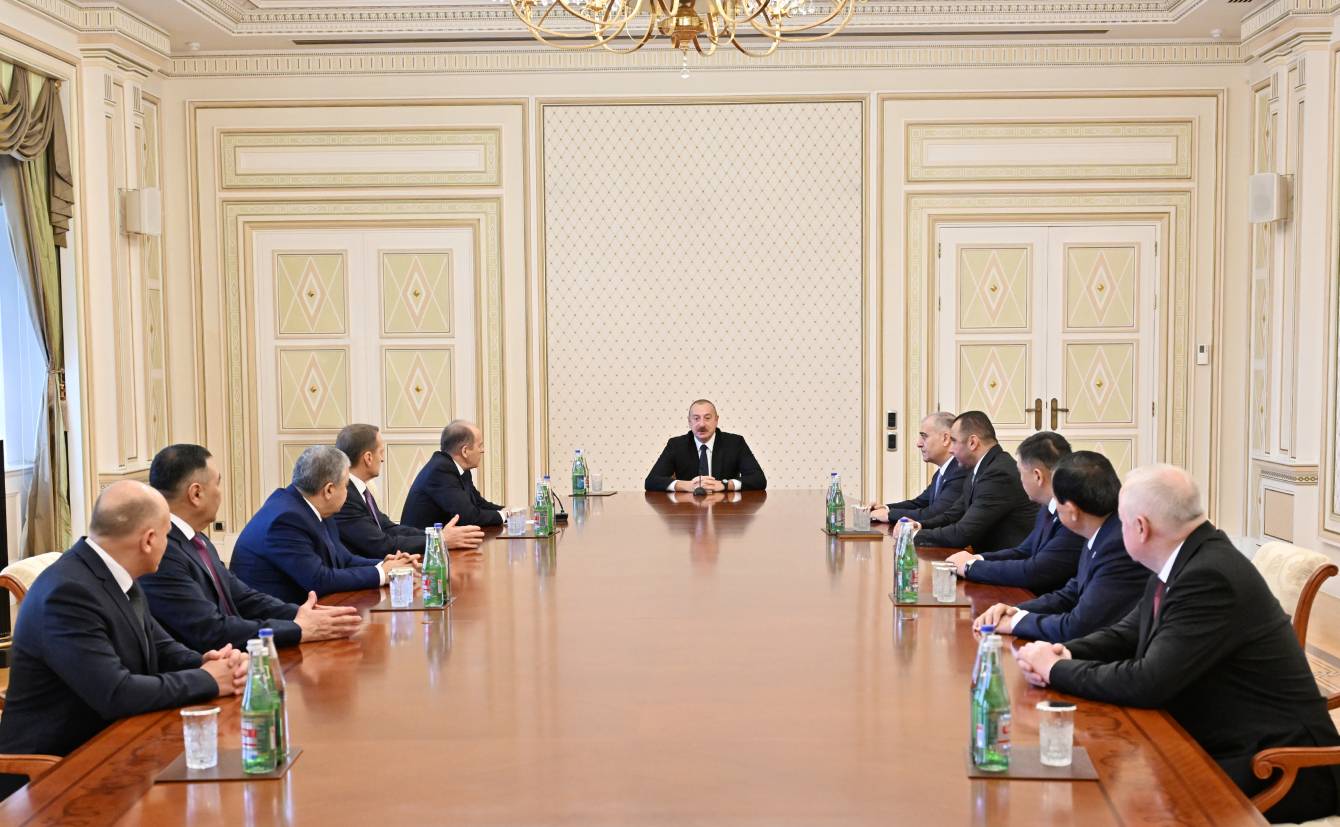
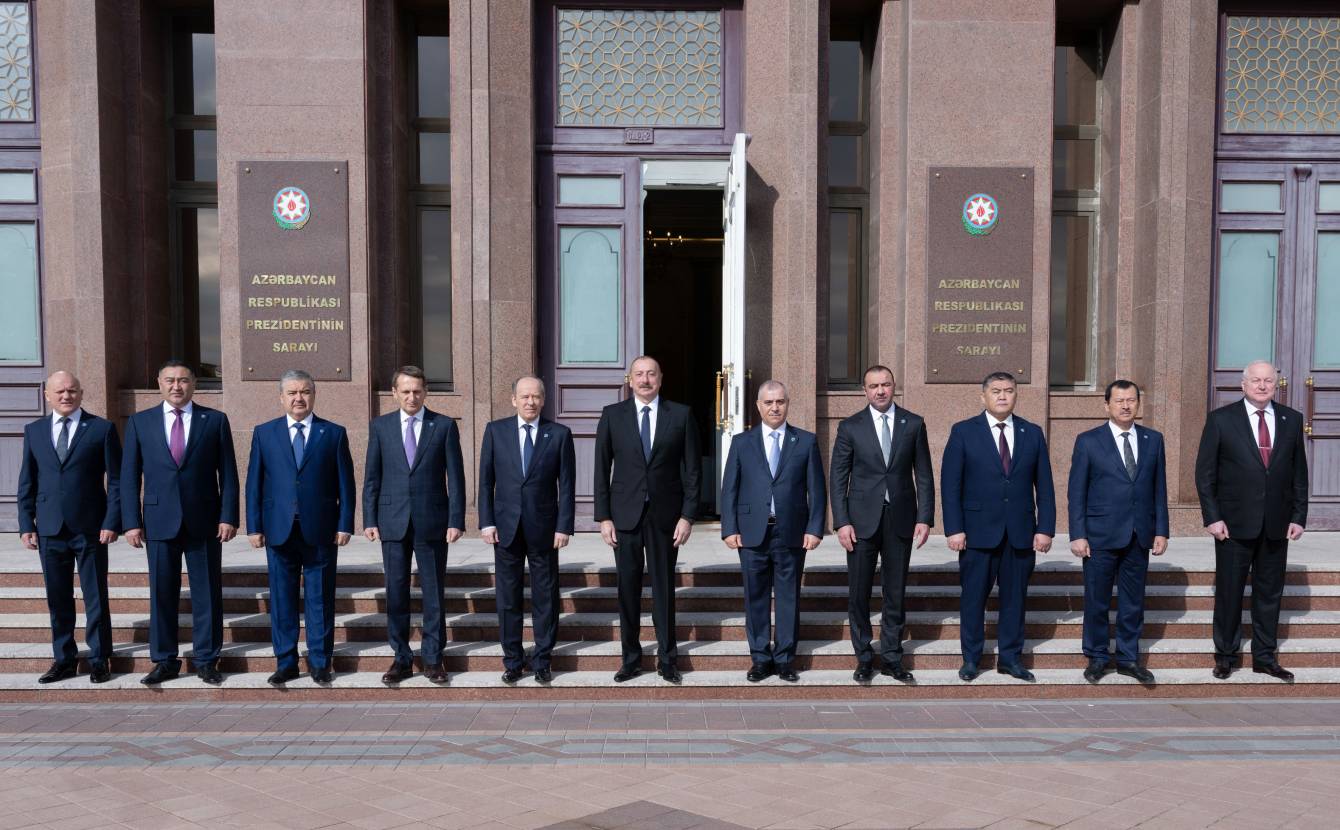

Your Eminence,
We were deeply saddened to hear of the passing of His Holiness Pope Francis, Head of the Holy See and one of the most prominent religious figures of our time.
In the person of Pope Francis, the international community and the Catholic world have lost...
21 April 2025, 14:13I sincerely congratulate you and the entire Christian community of Azerbaijan on the sacred holiday of Easter, and I extend my wishes of happiness and well-being to all of you.
In Azerbaijan, which has rich traditions of tolerance, there has never been a case of...
18 April 2025, 16:25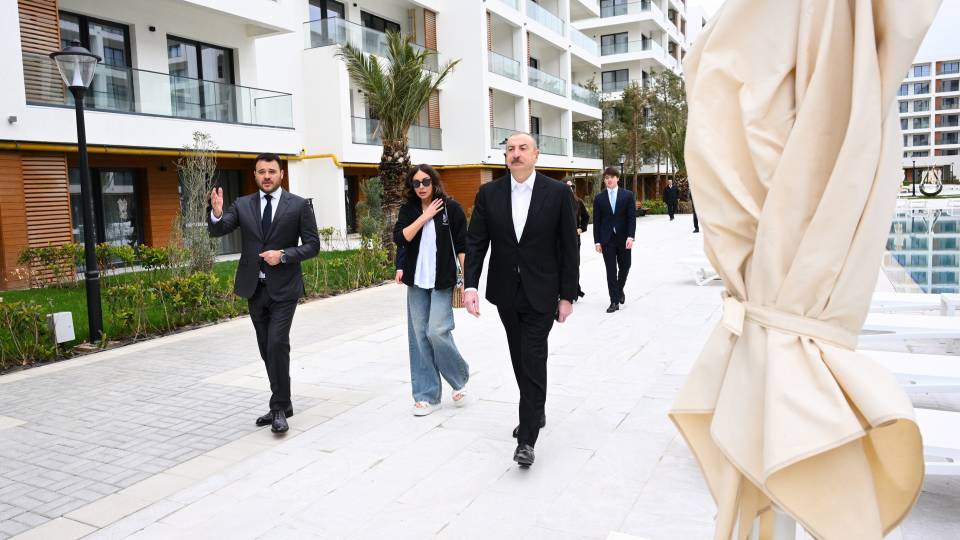
Dear Mr. Çavuşoğlu,
I was deeply saddened to learn of the passing of your father, Osman Çavuşoğlu — a profound loss for your family.
In this time of sorrow, I share in your grief and extend my deepest condolences to you and all the members of your family,...
18 April 2025, 12:37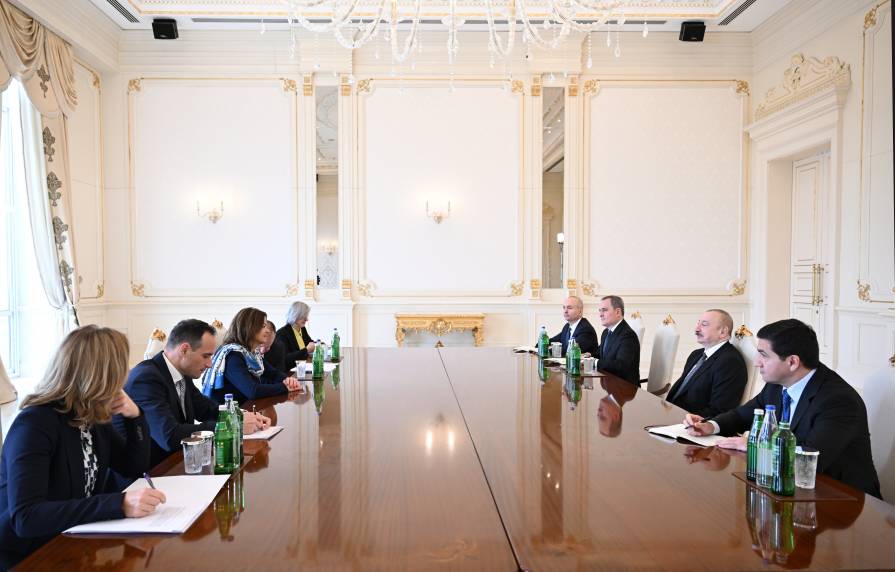
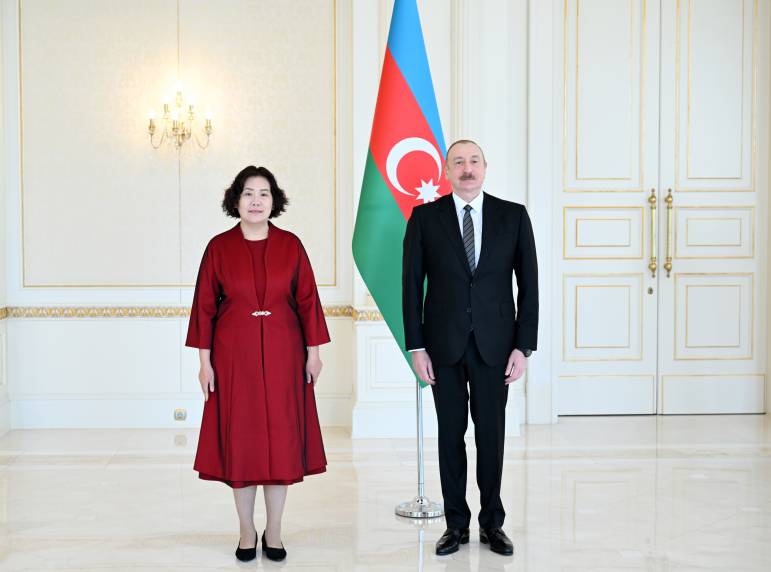
We were deeply saddened to learn of the passing of Richard Armitage – an eminent statesman, distinguished diplomat, dedicated public servant, and a great friend of Azerbaijan.
His years-long, productive service in international politics and diplomacy, coupled with...
16 April 2025, 18:06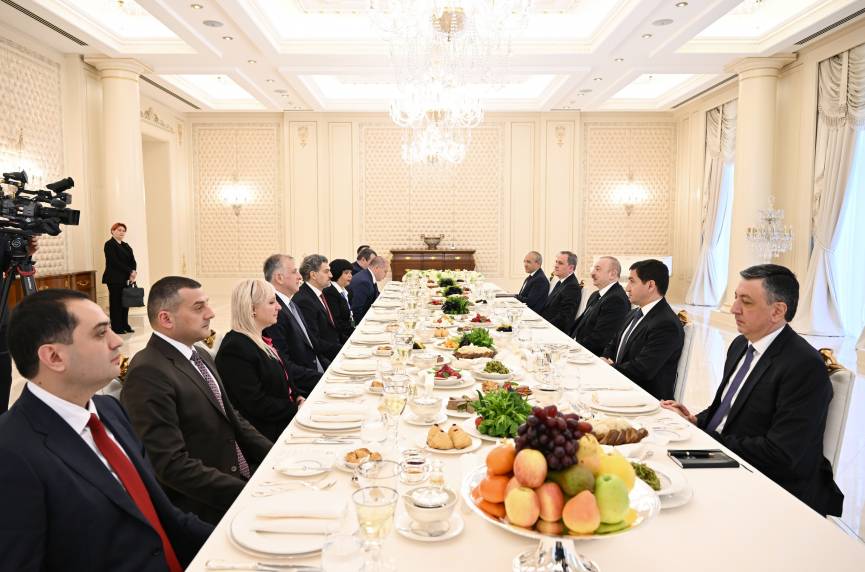
Statement by President Ilham Aliyev
- Dear Mr. President,
Dear guests,
Ladies and gentlemen,
Dear Mr. President, I would like to once again sincerely welcome you to Azerbaijan! I cordially congratulate you again on your election as a President and wish you ...
16 April 2025, 12:12